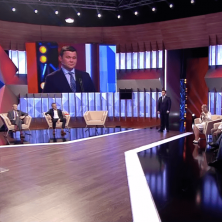On the first week of his presidency, Volodymyr Zelenskyy issued a number of decrees that caused a maelstrom of discussions about their consistency with the law. Some supported the President’s decisions, some did not, the others were plain confused. We verified the statements made by politicians from various factions in the TV program “Right to Power.”
Is the President’s decree to dismiss the Verkhovna Rada of Ukraine legal?
No verdict
“The Constitution does say that if there is no coalition in the Parliament, the President has the right to terminate the Parliament’s term of office ahead of schedule. There has been no coalition in the Ukrainian parliament for three years now.”
1:44:25 – 1:44:38 Yuliia Tymoshenko
No verdict
“The newly elected President is evidently violating the Constitution in the context of making the decision to dismiss the Parliament by his decree while the Parliament was technically in the process of forming the coalition. There is the thirty-day deadline; it is the constitutional standard. Violating it means undertaking […] the responsibility for violating the Constitution.”
1:21:30 – 1:21:54 Andrii Teteruk
True
“Dear Yuliia Volodymyrivna, neither you, nor I, nor Bohdan, nor anyone present can establish whether the decree is constitutional or not. This can only be established by the Constitutional Court.”
2:02:51 – 2:03:04 Ihor Mosiichuk
Joint comment:
One of the reasons for dismissing the Parliament is really the absence of coalition. That is precisely the reason that Zelenskyy used. He insists that there has been no coalition for over two years. If that is true, the decree on dismissal is legal.
In their turn, representatives of People’s Front and Petro Poroshenko’s Bloc (BPP) claim that the coalition ceased to exist on May 17, when People’s Front announced their exit, since before that, the coalition formally existed. The Parliament then has a month since May 17 to form a new coalition. If this position is to be accepted, Zelenskyy’s decree is not constitutional.
The law does not clearly explain who establishes the absence of the coalition and how it is done. Article 83 of the Constitution says that the reasons for termination of the coalition’s activity are established by the Constitution and the Procedure of the Parliament. This is the only time this termination is ever mentioned in the document, and it is not mentioned a single time in the Procedure.
The agency that establishes the constitutionality of the President’s acts is the Constitutional Court. On June 11, MPs’ motion on the constitutionality of the President’s decree on dismissal of the Parliament is scheduled for review.
Can the electoral system be changed two months ahead of the elections?
Manipulation
“There is a way to avoid these problems (with Central Electoral Commission’s procurement – ed. note), which is the Ministry of Economy adopting a law in which they lower the decision-making threshold, the amount. It is quite simple. In this case, the elections take place within the timeframe established by the law.”
2:18:51 – 2:19:12 Andrii Bohdan
The Ministry of Economic Development and Trade cannot reduce the threshold established in the law, because this is beyond the scope of its authority. Under the law, public procurement of goods for amounts exceeding UAH 200,000 requires organizing a tender, and this rule clearly also applies to the CEC. Since the procurement that CEC needs to organize for the off-schedule parliamentary elections exceeds the established threshold, the CEC is obliged to follow the rules of the tender procedure, but its duration exceeds the timeframe allowed by the electoral law.
To resolve this problem, the MEDT suggests organizing procurement not directly through the Central Electoral Commission, but separately for each territorial electoral commission, as it was done during the latest presidential elections. To do this, an order of the MEDT to make amendments to the Procedure of Identifying the Procurement Item is enough.
According to First Deputy Minister of Economic Development and Trade Maksym Nefyodov, approval of this order is underway.
False
“We cannot adopt a new law (on the elections – ed. note) after the electoral campaign has started, but we can make amendments to the existing one.”
1:06:43 – 1:06:50 Andrii Bohdan
The Constitution and the laws of Ukraine do not contain any prohibition concerning changing the electoral law after the beginning of the electoral campaign. However, any changes to the electoral rules made in such a short time before the voting violate electoral standards, and significant changes (such as termination of the single-seat electoral districts system) undermine the electoral procedure, since registration of parties and candidates and formation of electoral commissions have already started.
True
“Look at the coalition agreement functioning in this parliament. In the first lines of the agreement, there is a change of the electoral system.”
1:47:34 – 1:46:32 Yuliia Tymoshenko
Section 6 of the coalition agreement really stipulates the reform of the electoral legislation, namely introducing the open list proportional electoral system.
True
“In his inauguration speech, President Zelenskyy said that he is a steadfast supporter of the open list proportional system. […] And then what happens is the President does the complete opposite: closed party lists.”
1:10:13 – 1:10:44 Ihor Mosiichuk
In his inauguration speech, Zelenskyy did urge MPs to adopt the Electoral Code and introduce open lists. However, draft law 10319 on amendments to the electoral system submitted by Zelenskyy keeps the closed list system in place. The benefits of the open list system are laid out in detail in VoxUkraine’s article “On Behalf of the People. Ukraine Requires Electoral System Reform.”
Exaggeration
“We voted Yes (to changes to the electoral law – ed. note). In the Parliament, 92 MPs voted Yes.”
1:49:41 – 1:49:47 Yuliia Tymoshenko
Tymoshenko speaks about draft law 10319 on amendments to certain laws of Ukraine in connection with changes to the electoral system for elections of members of the Parliament of Ukraine. The law was really supported by 92 MPs, including 15 from the Batkivshchyna (Fatherland) faction. In total, there are 20 members in the faction, the remaining five were absent in the Parliament at the moment of the vote or did not vote.
Manipulation
“It was you who adopted the law on closed lists. […] We did not touch them, we just wanted to remove the single-seat electoral district system.”
1:12:33 – 1:12:52 Andrii Bohdan
The closed list electoral system exists in Ukraine since 1998. The latest changes to the electoral law were made in 2011, which means the current Parliament did not adopt closed lists. Zelenskyy’s draft law really does not change this but suggests eliminating the single-seat electoral districts system.
Does the lustration (public service “purge”) law apply to Andrii Bohdan?
False
“I became Head of the Presidential Administration on completely legal grounds. Under the law on lustration, I cannot hold public service positions included in a special list. But since I am not a public servant, this law does not apply to me in the context of this position.”
40:02 – 41:12 Andrii Bohdan
True
“He (Andrii Bohdan – ed. note) is clearly a public official who served in Azarov’s government – it is an established fact. Lustration does apply to him – this position is directly included in the law.”
1:26:01 – 1:26:20 Andrii Teteruk
False
“I was the deputy minister of the Cabinet of Ministers – the Government Commissioner for anti-corruption policy. After under one year of service, I was fired for closing a corruption scheme with public registers that were used to ‘pump out’ UAH 2 billion of public money every year.”
47:10 – 47:27 Andrii Bohdan
Joint comment:
Andrii Bohdan worked as a Government Commissioner for anti-corruption policy over a year: around the end of 2010 – beginning of 2011, and then in 2013-2014, and he does not mention the second term. Overall, he was the Commissioner for 1.5 years, not a year. This is important because lustration does not apply to those who worked on governmental positions for less than a year total.
In the law “On Lustration,” the position that Bohdan held is covered by lustration (Article 3, clause 5). And those to whom lustration applies cannot take office as the Head of the Presidential Administration (Article 2, clause 5). That is why in this case, the law is actually violated, and it does not matter that the Head of the PA is not a public service position.
VoxCheck does not comment on the reasons for Bohdan’s dismissal and does not verify the information on the corruption scheme.
False
“Such minor officials who worked nearly as cleaners in Yanukovych’s government and administration, lustration eliminated all of them. High-profile officials who held key positions in Yanukovych and Azarov’s time, they […] stayed on the same most important positions in Ukraine all five years, starting with President of Ukraine Petro Poroshenko.”
53:46 – 54:24 Yuliia Tymoshenko
The law “On Lustration” eliminated heads and deputy heads of executive authorities of various levels, managers of the USSR Communist Party of various levels, KGB agents and those who participated in persecution of Euromaidan activists. This means that lustration does not apply to “minor” officials. It does not apply to Petro Poroshenko, because he was a minister in Azarov’s government for less than a year (restriction established by the law). Besides, even if lustration did apply to him, he would still be able to hold office as the President, since the law “On Lustration” does not apply to elective posts.
Attention
The authors do not work for, consult to, own shares in or receive funding from any company or organization that would benefit from this article, and have no relevant affiliations





